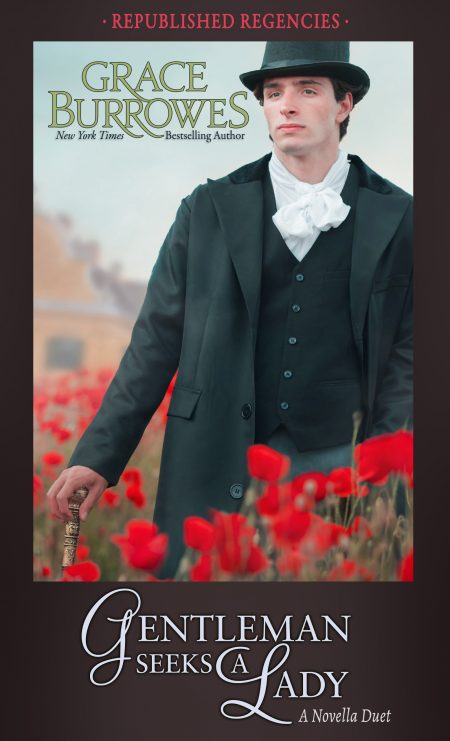Gentleman Seeks a Lady
A novella in the Republished Regencies series
Two PREVIOUSLY PUBLISHED Regency novellas. A is for Amorous (originally published in Love by the Letters) and Architect of My Dreams (originally published in No Dukes Allowed.)
A is for Amorous
Adalicia Beauvais has no use for children, and even less use for most men. Plato wasn’t a bad sort, and Euclid was bright enough, but the modern variety of male holds no appeal for her. To earn ownership of a lovely country estate with a delightfully well stocked library, Ada must raise funds for an orphanage full of noisy, malodorous urchins.
As if that isn’t challenge enough, her only ally in this endeavor, is the headmaster, Lord John, who loves children, referees cricket matches, and plucks Ada’s very, very last nerve, even though she knows his devotion to the children is genuine, as is the orphanage’s need for funds. Opposites don’t always attract, but in this case, they must work together for thirty days, or neither Ada’s nor John’s dreams will ever come true.
Architect of My Dreams
Eugenia, Dowager Duchess of Tindale, travels to the Brighton shore for a respite from London’s din and crowding. She is both dismayed and curious to find that Adam Morecambe, the very architect whose building project has rendered her London street unbearably noisy, has also journeyed to Brighton. Adam is traveling on business–he’s always on business–though he’s also pleased to bump into the duchess who has the loveliest smile he’s ever seen.
Genie has no intention of ever remarrying–once was bad enough–and Adam would never allow a romantic frolic to interfere with his busy schedule, but then he learns that Genie’s kisses are as sweet as her smiles, and all of his fixed notions about what the future might hold go flying out the nearest bedroom window.
Enjoy An Excerpt







Architect Adam Morcambe is about to meet an unstoppable force in the person of Eugenia, Dowager Duchess of Tindale. Immovable architects, beware!
“Works a treat, every time,” Rosenbarker said as the mason’s apprentices began piling the stones onto the lifts. “Wish you’d thought of this tipper wagon business ten years ago.”
As the apprentice turned the crank, the wagon bed slowly returned to level, a sight that always gave Adam Morecambe pleasure. The mechanism was essentially a large screw with a shallow thread angle, rotated by a long handle. Thanks to Mr. Maudsley’s screw-cutting lathe, an invention a mere two decades old, Adam was making other wagons like it.
“The gears sound like they need oiling,” he said, “and the whole purpose of the tipper wagon is so work can proceed more efficiently, not so you can stand around admiring the results.”
The bed settled, the apprentice threw the brace securing the crank handle, and the driver gave the horses the signal to trot off.
“I do hope you’ve built rest for the horses into the schedule,” Rosenbarker said. “Nobody designed them any fancy mechanisms to ease their work, and when the stones were unloaded by hand, the horses got a half hour’s respite.”
“They need half an hour’s rest for every load? That much?”
Rosenbarker took off his glasses and used a wrinkled handkerchief to clean them. Building was dusty work.
“You needn’t allow the horses their rest, Morecambe. You can simply work them until they drop. Then the seasoned teams wear out faster, the nervous youngsters are put to in greater quantity, and we have more coaches galloping off across more village greens on market day. The choice is yours.”
Solomon Rosenbarker’s memory was one of his finest qualities—usually. “That was one team, three years ago, and I still contend a wasp was involved.”
Rosenbarker widened his stance and stuffed his glasses in one pocket, his handkerchief in the other. “Two and a half years, and the cost in damages ate up twenty percent of—you have trouble, sir. The kind that wears bonnets.”
Rosenbarker sidled away to supervise the sorting of the rocks, which needed no supervision. The old rascal was staying close enough to overhear the coming confrontation, but far enough away so that no stray verbal bullets would threaten him.
Trouble was a fetching pair of women in fashionable day dresses. The taller of the two wore the gaudier bonnet—two birds and an entire bouquet of silk roses. She also carried a lot of pink lace on a stick that was probably intended to resemble a parasol.
The smaller woman walked slightly ahead of her companion. Her bonnet was plain straw, her parasol unpretentious. Adam had no interest in women’s fashions, or in most women, but he knew an angry swish of skirts from a flirtatious swish of skirts, and the small woman had no flirtation on her mind.
“You are Mr. Morecambe,” she said, marching directly up to Adam.
“And you are angry.”
She was also pretty, though quietly so. Brown eyes framed with brows heavier than was fashionable, regular features, and a full mouth pinched with ire. Her hair was dark brown, what he could see of it, and she eschewed cosmetics.
The lady’s companion, then, charging forth at the behest of her more genteel associate. Somewhere on this street lived a dowager duchess, giving the neighborhood a dash of titled cachet. Had the street been burdened with a ducal residence, Adam would never have bought the Campbell property.
“I am not angry, Mr. Morecambe, I am exhausted and tormented by noise the livelong day. I refuse to suffer in silence any longer.”
He knew better than to apply logic to an annoyed woman, and yet, he asked the obvious question. “How can one suffer in silence if the noise is incessant?”
She looked down her nose at him, quite a feat considering she was nearly a foot shorter than he.
“Be obtuse if your intellect is truly that limited, sir, but save your disrespect for those to whom such a slight would matter. I demand some quiet.”
Rosenbarker was studying the pile of rocks. The other woman was pretending to be fascinated with the work site. Typical of London’s upper class, she was allowing her minion to do the figurative heavy lifting.
“Then I suggest you go somewhere quieter,” Adam said. “Nobody’s stopping you.”
“The common law of this great land says that you are the party who needs to go elsewhere,” Plain Bonnet retorted. “A woman is entitled to the quiet enjoyment of her domicile, as are my neighbors. That is the law. You will either accommodate the law, or deal with the consequences.”
Frilly Parasol was looking amused. Rosenbarker was blatantly staring.
Keep the lawyers out of sight was the first rule of sound business.
That was Adam’s last thought before somebody three floors up called out, “’Ware bucket!” in a thick Lancastrian accent.
Adam reacted instinctively, grabbing the woman and snatching her six feet farther from the street as a deluge of mud rained down from the scaffolding. Rosenbarker commenced swearing at the offending mason’s apprentice. Lady Frilly Parasol was laughing outright, and Adam was holding a small, curvaceous bundle of female closer than he’d held a woman in months.
“Let me go,” she said in a low, furious voice. “By the father of all mischief, if that is your idea of a joke, I will set fire to your benighted boys club during the four hours each night when none of your fiends are at work upon it. I will tear down every brick and stone and turn loose a plague of rodents upon your foundations. I will implore the heavens to stop your work with forty days and nights of rain. I will take my crusade to the journalists, who are ever mindful that widows in the throes of plights sell broadsheets.”
Adam turned her loose. “I’m a plight?” He wasn’t sure how he felt about being a plight, though the woman’s creativity was impressive.
“We are airing our differences on the street, or I’d be more blunt. Suffice it to say that your project is a plight, a plague, and a pestilence upon the peace of my home.”
If there was a second commandment in Adam’s business bible, it was to keep the journalists farther away from all projects than the lawyers, and trailing behind those two eternal verities was some nonsense about not arguing with a lady.
Adam had always thought that prohibition disrespectful of the ladies. In his experience, they were more than capable of holding their own in a verbal sparring match. Arguing with this lady was downright invigorating.
“Renovations are noisy undertakings,” Adam said. “Fortunately for you, our schedule will have us finished up by the end of the summer.” He smiled, because antagonizing the neighbors was stupid. “A few more months, and you’ll have an elegant façade where the Campbell’s crumbling abode once stood. Your street will gain consequence, and—”
“Stop it,” she snapped.
The hod carriers and masons weren’t due for their afternoon break for another hour, and yet, work from the scaffolding above had gone oddly quiet.
“Stop what?”
“You have offended a lady. The proper response is to apologize, not to explain the obvious in overly simplistic terms. If I had somehow arrived to the age of eight and twenty in ignorance of the fact that renovations are noisy, the past ten weeks would have proved the point handily. I care not one crumbled brick what your schedule says. The schedule of every decent beast on the planet calls for adequate and regular periods of rest and quiet.”
She’d jabbed his chest on the final three words: “rest”—jab—“and”—jab—“quiet”—jab-jab.
How could one small finger cause such a sharp pain? “We don’t work at night.”
“Mr. Morecambe, at this time of year, London enjoys almost eighteen hours of daylight, and that means your workers are already making a racket some two or three hours after polite society has gone to bed.”
“Why should I care about polite society?”
She stepped back, her gaze assessing. “Why shouldn’t you? Polite society will be your neighbors and, I assume, the membership of your little establishment, if not its investors. Do you really want the ladies on all sides up in arms against you before you open your doors?”
Adam was not much skilled at dealing with ladies. He shot a glance at Rosenbarker, whose expression conveyed foreboding.
“No,” Adam said, “but neither do I want my investors up in arms if the project falls behind schedule. If we’re not finished with the exterior by the end of September, we’ll have to halt until spring, and that will be costly.”
He cast a scowl at the crew now shamelessly goggling from their perches on the floors above. They grinned at him. One fellow saluted with his hammer. Another bowed over his bucket of mortar.
“If you do not allow me and my neighbors some rest,” the lady said, “we will seek redress from the courts and enjoin you from working more than ten hours a day.”
She spoke as if a judge stood ready to do her bidding, but then, spinsters—she was eight-and-twenty and loose on her own recognizance—were a particularly eccentric class of female.
“What exactly are you asking of me, madam?”
“I am departing from Town on Monday. I would like to begin my journey refreshed and rested. For the next three days, you will not allow your crews to start until nine of the clock.”
Lose three hours of labor per day per man on a thirty-man crew? Fall back two hundred and seventy hours in three days?
“What you ask is impossible.”
“Very well. Best call for the ratter, because you leave me no choice but to take matters into my own hands.”
She looked as if she relished that prospect. “I cannot lose hundreds of hours of labor when the weather is fair and deliveries have already been scheduled.”
“Then send your deliveries around back, for heaven’s sake.”
The other woman opened her lacy parasol and twirled it over her shoulder. “You seem to have the situation well in hand, my dear. I’ll just be going.” She kissed the shorter woman on the cheek, sent Adam a pitying look, and swanned off. Across the street, a footman opened the door to a fancy landau.
“She leaves you to fight this battle alone?”
“This is my battle, sir.”
Adam’s neighbor had faint shadows under her eyes, and her dress was of the pale gray usually worn in second mourning. No jewelry, not even a brooch, adorned her attire. Rosenbarker’s warning about the draft teams wearing out faster if they weren’t rested enough came to mind.
“You are the only person to complain of the noise,” he said, “and you are soon to leave Town.”
“Everybody is soon to leave Town, and then you can use the full moon to renovate through the night. I wish you the joy of that undertaking, but not until next week, please.”
Long ago, Adam had danced attendance on a proper lady. He’d haunted Mayfair’s ballrooms in hopes of a waltz with her, attended every Venetian breakfast and musicale in a vain effort to spend more time at her side.
He’d ended up numb with exhaustion and despair, which was probably the only reason he hadn’t finished the Season by delivering a challenge to a certain duke. Not that His Grace would have met Adam on the field of honor. Peers did not accept the challenges of commoners, which worked very nicely for the peer and not at all for the wronged commoner.
“I can have the deliveries sent around back for the next three days. I’ll tell the men not to start hammering until eight a.m.”
“Thank you, and please do exhort them to use less colorful language.”
She could exhort them to that end, and they’d probably listen. This small woman had presence, and she would be Adam’s neighbor. He could afford to accommodate her wishes on this one occasion—he hoped.
“I’ll make that request of the crews and wish you a pleasant respite in the country.”
She offered her hand. At first, he thought she wanted to shake hands with him, as if solemnizing the beginning of a pugilists’ match. He bowed over her hand after a moment of consternation.
She wished him good day and sashayed back from whence she’d come—a modest, tidy dwelling across the street.
“Get to work,” Rosenbarker called to the crews. “Back to work, ye bloody dunderwhelps, or I’ll know the reason why.”
On her doorstep, the lady turned, her expression pained.
“Language, Rosenbarker,” Adam muttered.
“What the hell’s wrong with my bloody bedamned—? Oh.” He swiped off his hat. “Beg pardon, missus,” he called across the street.
She slipped into the house, and within seconds, somebody was pounding away with a hammer. A second and third hammer joined in, a hod carrier started singing about Barbara Allen, and one of the Welshmen glazing windows added harmony.
“We do make quite a racket, don’t we?” Adam mused.
“That’s the sound of progress,” Rosenbarker said.
Noisy progress. The lady hadn’t been wrong. Thank goodness Adam was also traveling away from Town, because some peace and quiet by the seaside would be much appreciated.
Order your copy of Gentleman Seeks a Lady!
End of Excerpt
Gentleman Seeks a Lady is available in the following formats:

Grace Burrowes Publishing
August 1, 2021
- Grace’s BookstoreThis is Grace’s
independent
ebook store.
Your purchase can be added to any device. - Barnes & Noble Nook
- Kobo
- Apple Books
- Amazon Kindle
eBook:
Other eBook Purchase Options:
Print:
- Kobo UK
- Booktopia AUS
- Amazon UK
- Amazon Kindle UK
United Kingdom:
Connected Books
Gentleman Seeks a Lady is a novella in the Republished Regencies series. The full series reading order is as follows:
- Novella: Love Undisguised
- Novella: The Windham Ducal Duet
- Novella: A Duke Walked into a House Party
- Novella: A Lady Without Peer
- Novella: Holiday Duet — Republished Regencies
- Novella: Gentleman Seeks a Lady
- Novella: Windham Family Duet
- Novella: The Duke and the April Flowers
- Novella: Love Disguised (A Previously Published Regency Short Story)
- Novella: A Gentleman Worthy of Kisses
- Novella: Worth More Than Rubies























